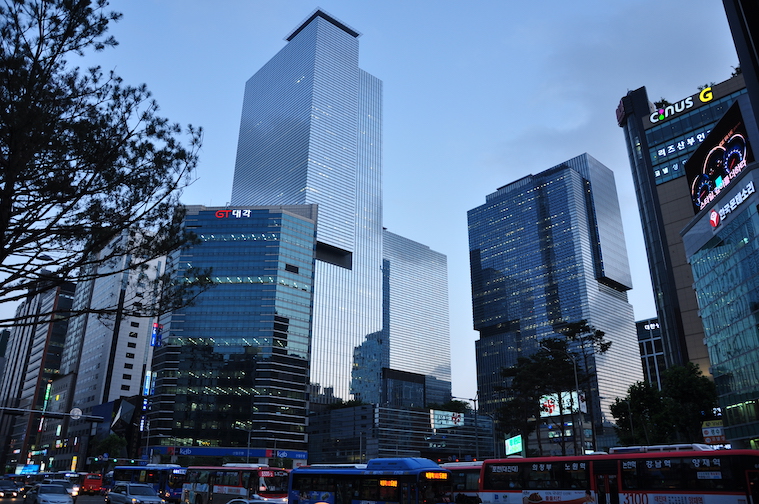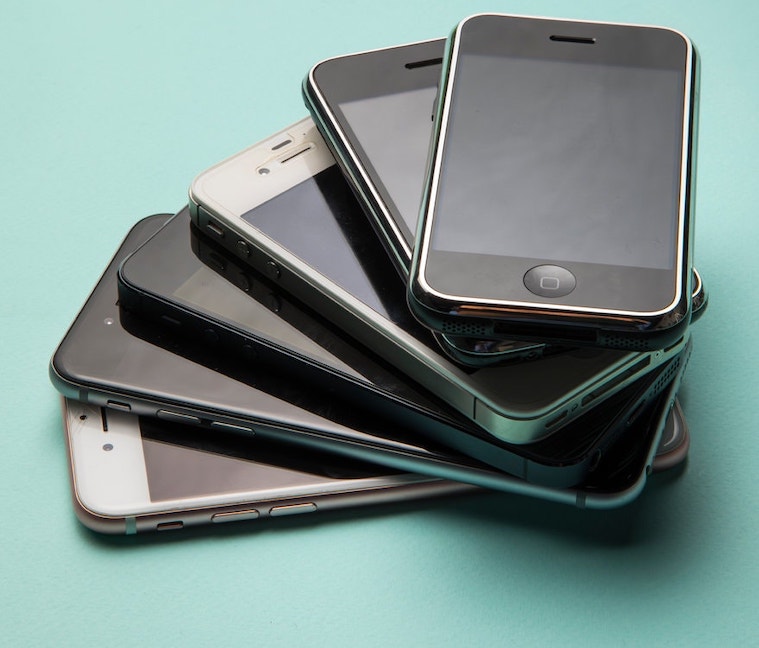Home » Industry Watch
In Loving Memory of Clarence Beeks'They're panicking!'
SAMSUNG TOWN (Rixstep) — Samsung (Hangul: 삼성; Hanja: 三星) is a South Korean multinational conglomerate headquartered in Samsung Town, Seoul. It comprises numerous affiliated businesses, most of them united under the Samsung brand, and is the largest South Korean chaebol (business conglomerate).
Samsung was founded by Lee Byung-chul in 1938 as a trading company. Over the next three decades, the group diversified into areas including food processing, textiles, insurance, securities and retail. Samsung entered the electronics industry in the late 1960s and the construction and shipbuilding industries in the mid-1970s; these areas would drive its subsequent growth.
Notable Samsung industrial affiliates include Samsung Electronics (the world's 2nd largest information technology company measured by 2015 revenues, and 5th in market value), Samsung Heavy Industries (the world's 2nd largest shipbuilder measured by 2010 revenues), and Samsung Engineering and Samsung C&T. Other notable subsidiaries include Samsung Life Insurance (the world's 14th largest life insurance company), Samsung Everland (operator of Everland Resort, the oldest theme park in South Korea), and Cheil Worldwide (the world's 15th largest advertising agency measured by 2012 revenues).
Samsung has a powerful influence on South Korea's economic development, politics, media and culture and has been a major driving force behind the 'Miracle on the Han River'. Its affiliate companies produce around a fifth of South Korea's total exports. Samsung's revenue was equal to 17% of South Korea's $1,082 billion GDP.

Samsung & Apple
In December 2011, Samsung Electronics sold its hard disk drive business to Seagate.
In first quarter of 2012, Samsung Electronics became the world's largest mobile phone maker by unit sales, overtaking Nokia, which had been the market leader since 1998.
On 24 August 2012, nine US jurors ruled that Samsung had to pay Apple $1.05 billion in damages for violating six of its patents on smartphone technology. The award was still less than the $2.5 billion requested by Apple. The decision also ruled that Apple did not violate five Samsung patents cited in the case. Samsung decried the decision saying that the move could harm innovation in the sector. It also followed a South Korean ruling stating that both companies were guilty of infringing on each other's intellectual property. In first trading after the ruling, Samsung shares on the Kospi index fell 7.7%, the largest fall since 24 October 2008, to 1,177,000 Korean won.
Apple then sought to ban the sales of eight Samsung phones (Galaxy S 4G, Galaxy S2 AT&T, Galaxy S2 Skyrocket, Galaxy S2 T-Mobile, Galaxy S2 Epic 4G, Galaxy S Showcase, Droid Charge, and Galaxy Prevail) in the United States which has been denied by the court.
In January 2016, Samsung announced it will be working with Microsoft to develop IoT devices based on Windows 10, where the companies will work together to develop products that will run on the platform, as well as integrate with other companies developing hardware and services on Microsoft's OS.
Samsung has made the following acquisitions and attempted acquisitions.
Rollei, Fokker, AST Research, FUBU, Lehman Brothers, MEDISON, Grandis, mSpot, NVELO, NeuroLogica, SmartThings, Quietside, Proximal Data, LoopPay, YESCO, Viv, Rich Communications Services.
Samsung comprises around 80 companies. It is highly diversified, with activities in areas including construction, consumer electronics, financial services, shipbuilding, and medical services.
Apple
Apple Inc is a US multinational technology company headquartered in Cupertino, California, that designs, develops, and sells consumer electronics, computer software, and online services. Its hardware products include the iPhone smartphone, the iPad tablet computer, the Mac personal computer, the iPod portable media player, the Apple Watch smartwatch, and the Apple TV digital media player. Apple's consumer software includes the OS X and iOS operating systems, the iTunes media player, the Safari web browser, and the iLife and iWork creativity and productivity suites. Its online services include the iTunes Store, the iOS App Store and Mac App Store, and iCloud.
The company's manufacturing, procurement and logistics enable it to execute massive product launches without having to maintain large, profit-sapping inventories. In 2011, Apple's profit margins were 40 percent, compared with between 10 and 20 percent for most other hardware companies.

Brian Chen
Technology reporter Brian X Chen has been published by many of the major IT zines, including the Seattle Times, Wired, and of course the New York Times.
On 26 September, Chen published a new piece at the New York Times.
'Last year's iPhones don't feel outdated. Phone reviews do.'
https://www.nytimes.com/2019/09/26/technology/personaltech/why-we-upgraded-our-reviews...
Chen goes on to look closer at reader feedback, reader experience using smartphones, and planned obsolescence.
'Reviews of new devices don't normally function as an assessment of older ones, I thought. But new devices don't normally replace their predecessors on a steady once-a-year schedule, either. So it was fair for these readers to wonder: Were thumbs-up or thumbs-down reviews like mine just fueling a hype cycle?'
Chen's main points.
- Older iPhones aren't slowing down
- The leaps in smartphone innovation no longer feel as big as they used to
- People are no longer financially incentivised to upgrade their phones every two years
Chen reflects.
'Despite all these market changes, many smartphone reviews, including mine, had not revised the formula that was born over a decade ago.'

A Squishy Word
'Need is a squishy word. Anyone can come up with a reason that they 'need' a new gizmo. But the most objective advice we could come up with for people who are thinking about upgrading from an old iPhone is that they need a new device if their current one is at least five years old.'
He adds:
'Those older iPhones are still fast and their cameras are still great, and owners of those devices can replace their batteries for cheap to extend their lives.'
And:
'Based on our data, the iPhone 11 review was the most well-read iPhone review we have ever published, with hundreds of comments - some snarky but many of them grateful for the approach. We will continue tinkering with our formula on how we review smartphones, but in the meantime, we welcome feedback.'
And feedback he got, notably from MDN - Mac Daily News.
'You see, whatever The New York Times and Brian X Chen proclaim makes you stupid sheep run right out to stores, stand in line, and spend money that The New York Times and Brian X Chen don't think you have. You're too stupid to read a product review that actually reviews the product and then make rational distinctions between your current product and the one about which you've just read. You're also far too stupid to know if you can afford to improve your device or not. Let The New York Times and Brian X Chen tell you what to do. They know your financial situation and they know far better than you whether you need an ultra-wide camera or 5 hours more battery life per day.
'Ah, it's so nice to have the New York Times and Brian X Chen lead you by the nose, isn't it, you silly, stupid, bleating sheep?'
And the wonder of it is that MDN won't even see the irony.
Companies like massive Samsung - where 'diversity' is really practiced - can afford to discard and reinvest. Apple cannot. Once again, Apple put all their apples in one basket. Apple's 'recovery' after the NeXT takeover was marginal, and only marginal because, once again, Apple insisted on being Apple. So market share, despite a vastly superior OS from all possible points of view, stayed in the lower single digits.
The iPod was acquired, and revenues went up, but not in the computer market, despite expectations of a so-called 'halo effect'.
Apple quite literally invented the smartphone market. And did a bang-up job. And really truly put a 'dent in the universe'. But they're still a 'one-trick pony', and they know it. They quite literally abandoned their desktop OS, and it's only now, when iPhone sales are tanking considerably, that they want to jump into bed again with this former lover. Revealing their rather avaricious draconian tendencies in the process.
Samsung can go with the flow. Apple cannot. As much as two thirds of Apple blood is tied to mobile sales. Two thirds. The fanboys know it. They can sense it, feel it. And you can feel them panicking.
'How can the price be going down?'
- Mortimer Duke
'Upp som en sol, ner som en pannkaka.'
- Clarence Beeks
About RixstepStockholm/London-based Rixstep are a constellation of programmers and support staff from Radsoft Laboratories who tired of Windows vulnerabilities, Linux driver issues, and cursing x86 hardware all day long. Rixstep have many years of experience behind their efforts, with teaching and consulting credentials from the likes of British Aerospace, General Electric, Lockheed Martin, Lloyds TSB, SAAB Defence Systems, British Broadcasting Corporation, Barclays Bank, IBM, Microsoft, and Sony/Ericsson.
Rixstep and Radsoft products are or have been in use by Sweden's Royal Mail, Sony/Ericsson, the US Department of Defense, the offices of the US Supreme Court, the Government of Western Australia, the German Federal Police, Verizon Wireless, Los Alamos National Laboratory, Microsoft Corporation, the New York Times, Apple Inc, Oxford University, and hundreds of research institutes around the globe. See here.
All Content and Software Copyright © Rixstep. All Rights Reserved.
|